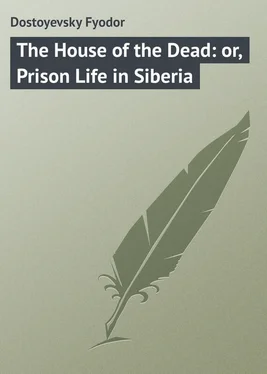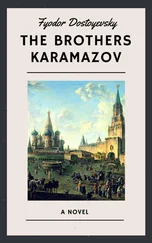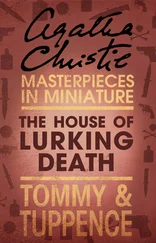Fyodor Dostoyevsky - The House of the Dead - or, Prison Life in Siberia
Здесь есть возможность читать онлайн «Fyodor Dostoyevsky - The House of the Dead - or, Prison Life in Siberia» — ознакомительный отрывок электронной книги совершенно бесплатно, а после прочтения отрывка купить полную версию. В некоторых случаях можно слушать аудио, скачать через торрент в формате fb2 и присутствует краткое содержание. Жанр: Классическая проза, literature_19, Русская классическая проза, foreign_language, на английском языке. Описание произведения, (предисловие) а так же отзывы посетителей доступны на портале библиотеки ЛибКат.
- Название:The House of the Dead: or, Prison Life in Siberia
- Автор:
- Жанр:
- Год:неизвестен
- ISBN:нет данных
- Рейтинг книги:3 / 5. Голосов: 1
-
Избранное:Добавить в избранное
- Отзывы:
-
Ваша оценка:
- 60
- 1
- 2
- 3
- 4
- 5
The House of the Dead: or, Prison Life in Siberia: краткое содержание, описание и аннотация
Предлагаем к чтению аннотацию, описание, краткое содержание или предисловие (зависит от того, что написал сам автор книги «The House of the Dead: or, Prison Life in Siberia»). Если вы не нашли необходимую информацию о книге — напишите в комментариях, мы постараемся отыскать её.
The House of the Dead: or, Prison Life in Siberia — читать онлайн ознакомительный отрывок
Ниже представлен текст книги, разбитый по страницам. Система сохранения места последней прочитанной страницы, позволяет с удобством читать онлайн бесплатно книгу «The House of the Dead: or, Prison Life in Siberia», без необходимости каждый раз заново искать на чём Вы остановились. Поставьте закладку, и сможете в любой момент перейти на страницу, на которой закончили чтение.
Интервал:
Закладка:
Dostoyevsky Fyodor
The House of the Dead; or, Prison Life in Siberia / with an introduction by Julius Bramont
INTRODUCTION
"The Russian nation is a new and wonderful phenomenon in the history of mankind. The character of the people differs to such a degree from that of the other Europeans that their neighbours find it impossible to diagnose them." This affirmation by Dostoïeffsky, the prophetic journalist, offers a key to the treatment in his novels of the troubles and aspirations of his race. He wrote with a sacramental fervour whether he was writing as a personal agent or an impersonal, novelist or journalist. Hence his rage with the calmer men, more gracious interpreters of the modern Sclav, who like Ivan Tourguenieff were able to see Russia on a line with the western nations, or to consider her maternal throes from the disengaged, safe retreat of an arm-chair exile in Paris. Not so was l'âme Russe to be given her new literature in the eyes of M. Dostoïeffsky, strained with watching, often red with tears and anger.
Those other nations, he said – proudly looking for the symptoms of the world-intelligence in his own – those other nations of Europe may maintain that they have at heart a common aim and a common ideal. In fact they are divided among themselves by a thousand interests, territorial or other. Each pulls his own way with ever-growing determination. It would seem that every individual nation aspires to the discovery of the universal ideal for humanity, and is bent on attaining that ideal by force of its own unaided strength. Hence, he argued, each European nation is an enemy to its own welfare and that of the world in general.
To this very disassociation he attributed, without quite understanding the rest of us, our not understanding the Russian people, and our taxing them with "a lack of personality." We failed to perceive their rare synthetic power – that faculty of the Russian mind to read the aspirations of the whole of human kind. Among his own folk, he avowed, we would find none of the imperviousness, the intolerance, of the average European. The Russian adapts himself with ease to the play of contemporary thought and has no difficulty in assimilating any new idea. He sees where it will help his fellow-creatures and where it fails to be of value. He divines the process by which ideas, even the most divergent, the most hostile to one another, may meet and blend.
Possibly, recognising this, M. Dostoïeffsky was the more concerned not to be too far depolarised, or say de-Russified, in his own works of fiction. But in truth he had no need to fear any weakening of his natural fibre and racial proclivities, or of the authentic utterance wrung out of him by the hard and cruel thongs of experience. We see the rigorous sincerity of his record again in the sheer autobiography contained in the present work, The House of the Dead . It was in the fatal winter of 1849 when he was with many others, mostly very young men like himself, sentenced to death for his liberal political propaganda; a sentence which was at the last moment commuted to imprisonment in the Siberian prisons. Out of that terror, which turned youth grey, was distilled the terrible reality of The House of the Dead . If one would truly fathom how deep that reality is, and what its phenomenon in literature amounts to, one should turn again to that favourite idyllic book of youth, by my countrywoman Mme. Cottin, Elizabeth, or the Exiles of Siberia , and compare, for example, the typical scene of Elizabeth's sleep in the wooden chapel in the snow, where she ought to have been frozen to death but fared very comfortably, with the Siberian actuality of Dostoïeffsky.
But he was no idyllist, though he could be tender as Mme. Cottin herself. What he felt about these things you can tell from his stories. If a more explicit statement in the theoretic side be asked of him, take this plain avowal from his confession books of 1870-77: —
"There is no denying that the people are morally ill, with a grave, although not a mortal, malady, one to which it is difficult to assign a name. May we call it 'An unsatisfied thirst for truth'? The people are seeking eagerly and untiringly for truth and for the ways that lead to it, but hitherto they have failed in their search. After the liberation of the serfs, this great longing for truth appeared among the people – for truth perfect and entire, and with it the resurrection of civic life. There was a clamouring for a 'new Gospel'; new ideas and feelings became manifest; and a great hope rose up among the people believing that these great changes were precursors of a state of things which never came to pass."
There is the accent of his hope and his despair. Let it prove to you the conviction with which he wrote these tragic pages, one that is affecting at this moment the destiny of Russia and the spirit of us who watch her as profoundly moved spectators.
JULIUS BRAMONT.Translations of Dostoïeffsky's novels have appeared as follows: – Buried Alive; or, Ten Years of Penal Servitude in Siberia, translated by Marie v. Thilo, 1881. In Vizetelly's One Volume Novels: Crime and Punishment, vol. 13; Injury and Insult, translated by F. Whishaw, vol. 17; The Friend of the Family and the Gambler, etc., vol. 22. In Vizetelly's Russian Novels: The Idiot, by F. Whishaw, 1887; Uncle's Dream; and, The Permanent Husband, etc., 1888. Prison Life in Siberia, translated by H. S. Edwards, 1888; Poor Folk, translated by L. Milman, 1894.
See D. S. Merezhkovsky, Tolstoi as Man and Artist, with Essay on Dostoïeffsky, translated from the Russian, 1902; M. Baring, Landmarks in Russian Literature (chapter on Dostoïeffsky), 1910.
PART I
CHAPTER I. TEN YEARS A CONVICT
In the midst of the steppes, of the mountains, of the impenetrable forests of the desert regions of Siberia, one meets from time to time with little towns of a thousand or two inhabitants, built entirely of wood, very ugly, with two churches – one in the centre of the town, the other in the cemetery – in a word, towns which bear much more resemblance to a good-sized village in the suburbs of Moscow than to a town properly so called. In most cases they are abundantly provided with police-master, assessors, and other inferior officials. If it is cold in Siberia, the great advantages of the Government service compensate for it. The inhabitants are simple people, without liberal ideas. Their manners are antique, solid, and unchanged by time. The officials who form, and with reason, the nobility in Siberia, either belong to the country, deeply-rooted Siberians, or they have arrived there from Russia. The latter come straight from the capitals, tempted by the high pay, the extra allowance for travelling expenses, and by hopes not less seductive for the future. Those who know how to resolve the problem of life remain almost always in Siberia; the abundant and richly-flavoured fruit which they gather there recompenses them amply for what they lose.
As for the others, light-minded persons who are unable to deal with the problem, they are soon bored in Siberia, and ask themselves with regret why they committed the folly of coming. They impatiently kill the three years which they are obliged by rule to remain, and as soon as their time is up, they beg to be sent back, and return to their original quarters, running down Siberia, and ridiculing it. They are wrong, for it is a happy country, not only as regards the Government service, but also from many other points of view.
The climate is excellent, the merchants are rich and hospitable, the Europeans in easy circumstances are numerous; as for the young girls, they are like roses and their morality is irreproachable. Game is to be found in the streets, and throws itself upon the sportsman's gun. People drink champagne in prodigious quantities. The caviare is astonishingly good and most abundant. In a word, it is a blessed land, out of which it is only necessary to be able to make profit; and much profit is really made.
Читать дальшеИнтервал:
Закладка:
Похожие книги на «The House of the Dead: or, Prison Life in Siberia»
Представляем Вашему вниманию похожие книги на «The House of the Dead: or, Prison Life in Siberia» списком для выбора. Мы отобрали схожую по названию и смыслу литературу в надежде предоставить читателям больше вариантов отыскать новые, интересные, ещё непрочитанные произведения.
Обсуждение, отзывы о книге «The House of the Dead: or, Prison Life in Siberia» и просто собственные мнения читателей. Оставьте ваши комментарии, напишите, что Вы думаете о произведении, его смысле или главных героях. Укажите что конкретно понравилось, а что нет, и почему Вы так считаете.












